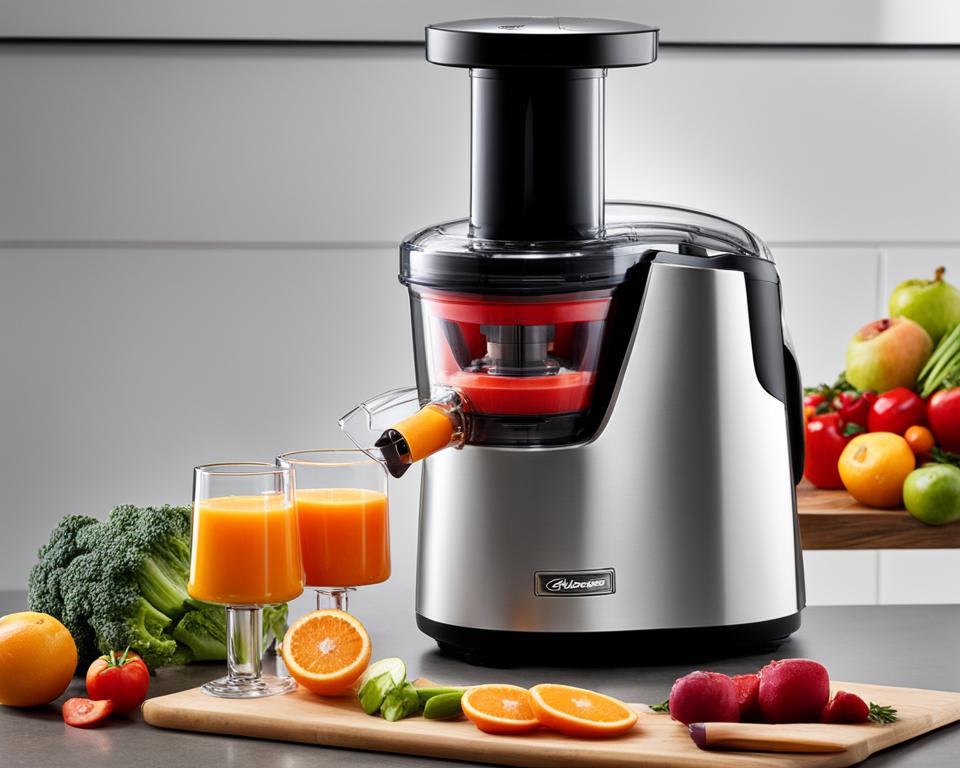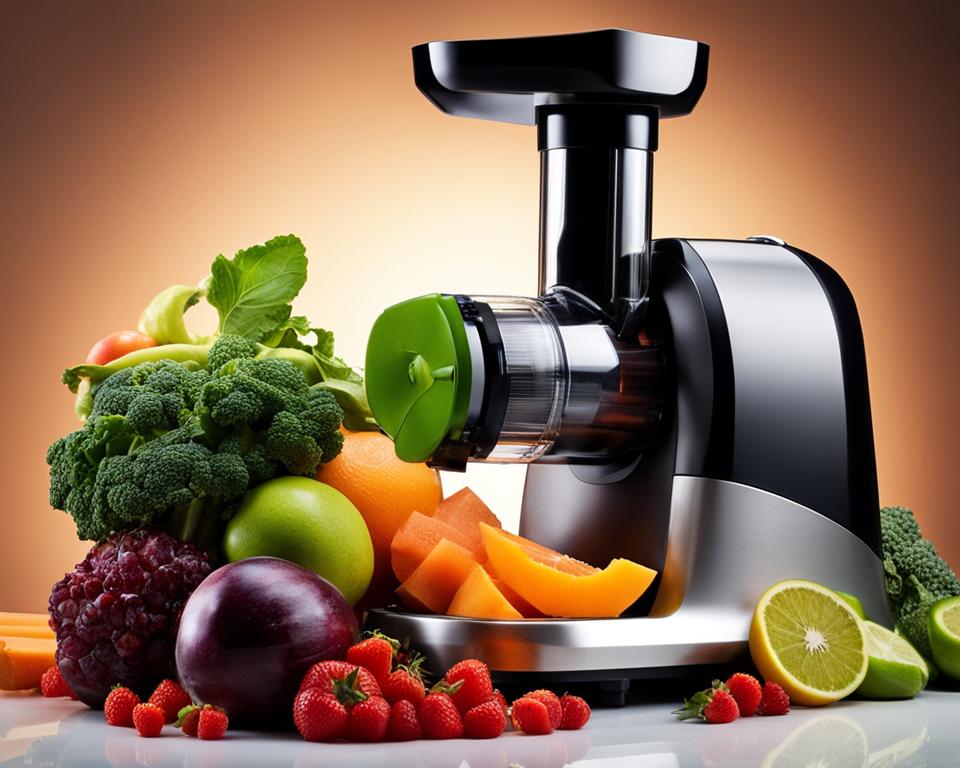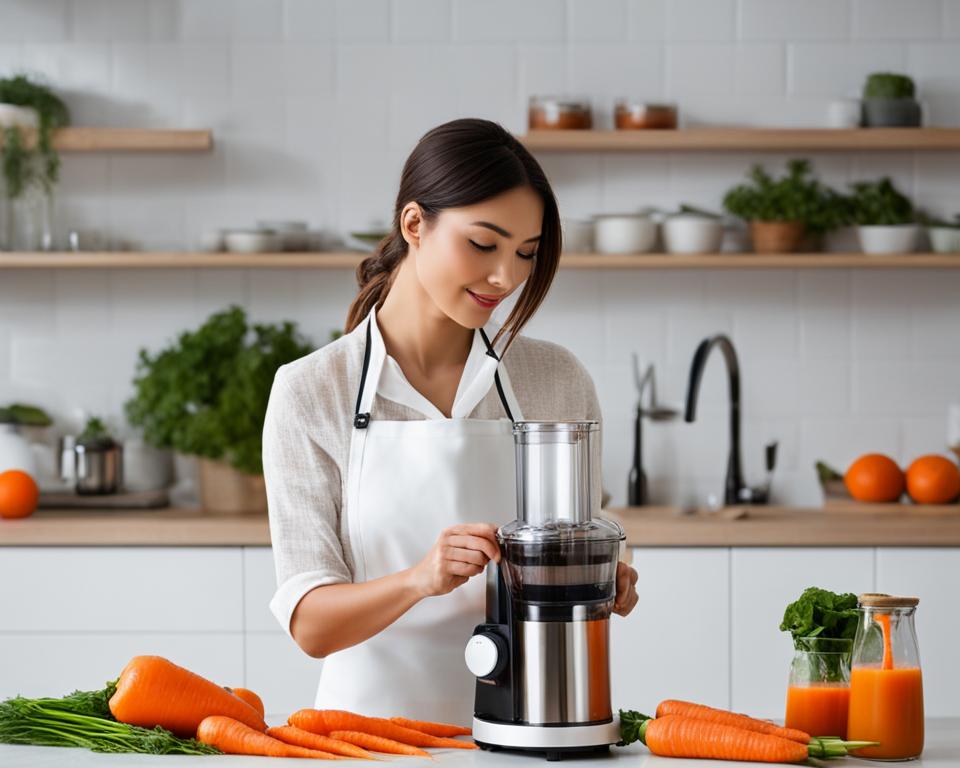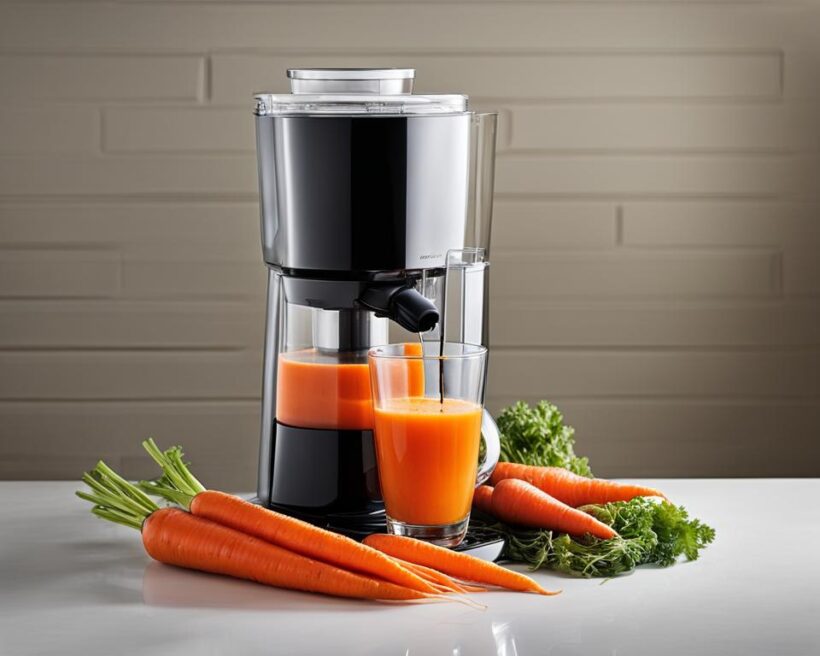Welcome to my comprehensive carrot juice machine buying guide! If you’re a juice enthusiast like me, you know the importance of finding the perfect juicer to meet your needs. In this guide, I’ll walk you through everything you need to consider when choosing a carrot juice machine. Whether you’re a beginner or a seasoned juicer, this guide will help you make an informed decision. So let’s dive in and explore the wonderful world of carrot juice machines!
When it comes to juicing, not all machines are created equal. That’s why it’s crucial to understand the different types of juicers and their pros and cons. From centrifugal to masticating and triturating juicers, each has its own unique features and benefits. By the end of this guide, you’ll have a clear understanding of which type of juicer is best suited for your juicing preferences.
Additionally, I’ll walk you through important factors to consider when making your purchase. From the type of produce you’ll be juicing to noise levels, ease of use, and cleaning, I’ll cover it all. Plus, we’ll discuss pricing and the long-term cost of juicing, ensuring you make a budget-friendly decision.
So, if you’re ready to embark on a delicious and healthy juicing journey, let’s get started with finding the perfect carrot juice machine for you!
Types of Juicers: Centrifugal, Masticating, and Triturating
When it comes to choosing a juicer, it’s important to understand the different types available. There are three main types of juicers: centrifugal, masticating, and triturating. Each type has its own unique features and benefits, so let’s take a closer look at each one.
Centrifugal Juicers
Centrifugal juicers are the most common and widely available juicers on the market. They work by using a rapidly spinning basket with tiny teeth that grind up the produce and force the juice through a sieve. These juicers are best suited for hard fruits and vegetables like carrots and apples. They are known for their speed and efficiency, making them a popular choice for those who want quick and easy juicing.
However, one drawback of centrifugal juicers is that they tend to produce foam and may not be ideal for leafy greens. The high-speed spinning can introduce more air into the juice, resulting in a frothy texture. If you primarily juice fruits and hard vegetables and value speed and convenience, a centrifugal juicer may be the right choice for you.
Masticating Juicers
Masticating juicers, also known as slow juicers or cold press juicers, are a popular option for those who want to get the most out of their produce. These juicers work by mimicking the chewing process, slowly crushing the fruits and vegetables and pressing out the juice. The slow and gentle extraction process helps to preserve more nutrients and enzymes, resulting in higher quality juice.
Masticating juicers are particularly well-suited for leafy greens and can extract juice from wheatgrass, kale, and other delicate greens with ease. They are also versatile machines that can be used to make nut butters, baby food, and even frozen desserts. While masticating juicers work at a slower pace compared to centrifugal juicers, many people appreciate the superior juice yield and nutrient preservation they offer.
Triturating Juicers
Triturating juicers, also known as twin gear juicers, are the most advanced and efficient type of juicers available. These juicers use two rotating gears to crush and grind the produce, extracting the maximum amount of juice. The gears rotate at a slow speed, allowing for thorough extraction and minimal oxidation.
Triturating juicers are particularly well-suited for vegetables and leafy greens, producing high juice yields and dry pulp. They can handle both hard and soft fruits with ease and also offer additional culinary functions like grinding nuts and chopping veggies. However, it’s important to note that triturating juicers tend to be more expensive than centrifugal or masticating juicers.
| Type of Juicer | Pros | Cons |
|---|---|---|
| Centrifugal | Fast and efficient Affordable Ideal for hard fruits and vegetables |
May produce foam Not suitable for leafy greens |
| Masticating | Preserves nutrients and enzymes High juice yield Can make nut butters and baby food |
Slower compared to centrifugal juicers More expensive |
| Triturating | Highest juice yield Efficient extraction Additional culinary functions |
More expensive than other types of juicers |
Now that you have a better understanding of the different types of juicers available, you can make an informed decision based on your juicing needs and preferences. Consider factors like the types of produce you’ll be juicing most often, speed, nutrient preservation, and budget. With the right juicer, you can enjoy fresh and nutritious juice right at home.
“Choosing the right juicer is essential for getting the most out of your fruits and vegetables. Understanding the differences between centrifugal, masticating, and triturating juicers can help you make an informed decision that suits your needs.” – Juicing Expert
Factors to Consider When Choosing a Carrot Juice Machine
When selecting a carrot juice machine, there are several crucial factors to keep in mind to ensure you find the perfect juicer for your needs. By considering these factors, you can make an informed decision and enjoy delicious carrot juice at home.
Noise Level
The noise level of a juicer is an important consideration, especially if you plan to juice early in the morning or have roommates or family members who are sensitive to loud noises. Look for a juicer that operates quietly without compromising on performance.
Type of Produce
Think about the type of produce you’ll be juicing most often. If you primarily juice hard fruits and vegetables like carrots and apples, a centrifugal juicer may be the ideal choice. However, if you prefer juicing leafy greens like wheatgrass and kale, a masticating juicer with higher juice yields and nutrient preservation may be a better option.
Easy to Use and Clean
Consider the ease of use and cleaning when choosing a carrot juice machine. Look for juicers with intuitive controls and clear instructions. Additionally, opt for juicers with dishwasher-safe parts and specialized cleaning brushes to make the cleaning process quick and hassle-free.
It’s also worth considering the size and storage options of the juicer, particularly if you have limited counter space. Some juicers have a larger footprint and may require more storage space when not in use.
Price and Long-Term Cost
The price of the juicer is another crucial factor to consider. Set a budget and look for a juicer that offers the best value for your money. Additionally, consider the long-term cost of juicing, including the price of produce and any additional accessories or maintenance required.
By taking these factors into account, you can find a carrot juice machine that meets your requirements and allows you to enjoy fresh, nutritious juice whenever you want.
Pros and Cons of Centrifugal Juicers
Centrifugal juicers are a popular choice for many juicing enthusiasts due to their speed and affordability. These juicers utilize a rapidly spinning basket with tiny teeth to grind up produce and extract juice. However, like any other appliance, centrifugal juicers come with their own set of advantages and disadvantages that potential buyers should consider.
Pros of Centrifugal Juicers
- Speed: One of the main advantages of centrifugal juicers is their ability to extract juice quickly. The fast-spinning action allows for rapid juicing, making them a great choice for those with busy lifestyles.
- Affordability: Centrifugal juicers are often more budget-friendly compared to other types of juicers. This makes them a popular choice for beginners or individuals who want to try juicing without breaking the bank.
- Convenience: These juicers are generally easy to set up and use, making them a convenient option for those who want a hassle-free juicing experience.
Cons of Centrifugal Juicers
- Foam and Oxidation: One downside of centrifugal juicers is that they tend to produce more foam and oxidation compared to other juicers. This can result in less smooth and frothy juice, which may not be appealing to some individuals.
- Not Ideal for Leafy Greens: While centrifugal juicers work well for hard fruits and vegetables like carrots and apples, they may not be as efficient when it comes to juicing leafy greens. If you primarily juice greens, you may want to consider other juicer options.
- Noisy Operation: Another drawback of centrifugal juicers is that they can be quite noisy during operation. This can be a concern if you live in a shared living space or if you prefer a quieter juicing experience.
| Pros | Cons |
|---|---|
| Speedy juicing process | Produces more foam and oxidation |
| Affordable option | Not ideal for leafy greens |
| Convenient and easy to use | Noisy operation |
Overall, centrifugal juicers are a suitable choice for individuals who prioritize speed, affordability, and convenience in their juicing routine. However, if you prefer juicing leafy greens or prioritizing juice quality with minimal foam and oxidation, it may be worth exploring other types of juicers that align more closely with your needs.

Pros and Cons of Masticating Juicers
When it comes to choosing a juicer, masticating juicers offer several advantages and disadvantages. These juicers work by slowly chewing fruits and vegetables, resulting in higher juice yields and less foam. Here are the pros and cons of using masticating juicers:
Pros:
- Masticating juicers extract a higher amount of juice from produce, resulting in less waste.
- They produce less foam and oxidation, resulting in juice that stays fresh for longer periods.
- Masticating juicers are highly efficient when it comes to juicing leafy greens like wheatgrass and kale.
- These juicers can be versatile, capable of making nut butters and baby food.
Cons:
- Masticating juicers work at a slower pace compared to centrifugal juicers, so juicing can take a bit longer.
- They tend to have a higher price tag compared to other juicer types.
- Due to their slow and thorough extraction process, masticating juicers may require more effort when it comes to cleaning.
Despite these limitations, masticating juicers are still a popular choice among juicing enthusiasts who prioritize juice quality and nutrient preservation. Their ability to extract a high yield of juice with minimal foam makes them ideal for individuals who frequently juice leafy greens and are willing to invest in a higher-end juicer.

Pros and Cons of Triturating Juicers
Triturating juicers, also known as twin gear juicers, offer some distinct advantages and disadvantages compared to other types of juicers. These juicers use two interlocking gears to crush and grind produce, resulting in a high juice yield and dry pulp. Here are the pros and cons of triturating juicers:
“Triturating juicers provide the highest juice yield and are versatile but come at a higher cost.”
Pros of Triturating Juicers
Triturating juicers excel at extracting juice from both hard and soft fruits, making them incredibly versatile. They can handle a wide range of produce, including vegetables, leafy greens, and even wheatgrass. The twin gears work meticulously to crush and grind the ingredients, ensuring that every last drop of juice is extracted. As a result, triturating juicers offer the highest juice yield, producing a pure and nutrient-rich liquid.
In addition to juicing, triturating juicers often come with additional functions. These machines can be used to make nut butters, baby food, and even grind seeds and nuts. This versatility allows users to explore various culinary options and get the most out of their investment.
Cons of Triturating Juicers
One of the main drawbacks of triturating juicers is their higher cost compared to other juicer types. Due to their intricate design and advanced functionality, these juicers tend to be more expensive. However, for those who are committed to juicing and value the maximum juice yield, the investment may be worth it.
Another consideration is the size and footprint of triturating juicers. These machines typically have a larger size compared to centrifugal and masticating juicers. If you have limited counter space or prefer a more compact juicer, a triturating juicer may not be the ideal choice.
Summary
In summary, triturating juicers offer the highest juice yield and versatility, making them well-suited for juicing a wide range of produce. While they come at a higher cost and have a larger footprint, the benefits of their exceptional performance and additional culinary functions may outweigh these drawbacks for avid juicers seeking top-quality juice. Consider your budget, juicing needs, and available space to determine if a triturating juicer is the right choice for you.

Conclusion
After considering your juicing needs and preferences, it is clear that choosing the right carrot juice machine is essential. With three main types of juicers available – centrifugal, masticating, and triturating – each offering its own advantages and disadvantages, it’s important to evaluate them based on your specific requirements.
Centrifugal juicers are a great option for beginners or those on a budget who primarily juice hard fruits and vegetables like carrots and apples. They are affordable, easy to set up and use, but may not be ideal for leafy greens. On the other hand, masticating juicers provide high juice yields, less foam, and oxidation, making them perfect for leafy greens, wheatgrass, and even nut butters. Although they are slower and more expensive, they are a worthwhile investment for frequent juicers who prioritize nutrient preservation.
For those seeking maximum juice yield and versatility, triturating juicers are the top choice. With their ability to crush and grind produce, they extract the most juice and leave behind dry pulp. While they come at a higher cost and have a larger footprint, they are capable of handling various fruits and vegetables, and even perform additional culinary tasks like grinding seeds and nuts.
Ultimately, when selecting a carrot juice machine, consider factors such as noise level, ease of use and cleaning, and price. By carefully evaluating your options and understanding the pros and cons of each type of juicer, you can make an informed decision and enjoy delicious and nutritious juices at home.
FAQ
What are the three main types of juicers?
The three main types of juicers are centrifugal, masticating, and triturating.
What is a centrifugal juicer?
A centrifugal juicer uses a rapidly spinning basket with tiny teeth to grind up produce and force the juice through a sieve.
What is a masticating juicer?
A masticating juicer mimics chewing and press the maximum amount of juice from pulp.
What is a triturating juicer?
A triturating juicer uses rotating twin gears to crush and grind produce, resulting in the highest juice yield.
What factors should I consider when choosing a carrot juice machine?
You should consider factors like the type of produce you want to juice, noise level, ease of use and cleaning, and price.
What are the pros and cons of centrifugal juicers?
Centrifugal juicers are affordable and great for beginners but may not be ideal for leafy greens and produce foam.
What are the pros and cons of masticating juicers?
Masticating juicers offer high juice yields and preserve nutrients but are slower and more expensive than centrifugal juicers.
What are the pros and cons of triturating juicers?
Triturating juicers provide the highest juice yield and are versatile but come at a higher cost and have a larger footprint.



